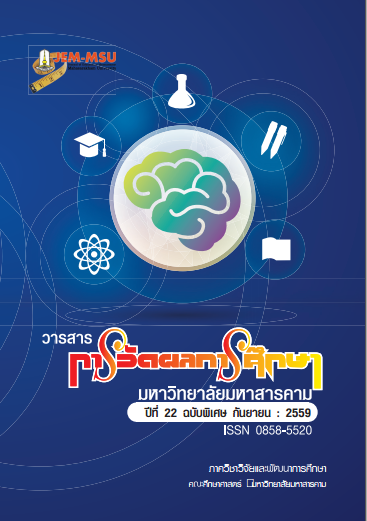Comparison of Learning Achievement Scientific Process Skills and Retention in Chemistry Stoichiometry of Matthayomsuksa 4 Students between Using CIPPA Model and Problem-based Learning
Main Article Content
Abstract
The CIPPA model and the problem-based learning is a learning model which
emphasizes the problem solving process and learning by doing. The purpose of this
research each were ; to study the effectiveness index of lesson plans using CIPPA
and Problem-based learning model in Matthayomsuksa 4 ; to find out effectiveness
indices of lesson plans using CIPPA learning model and problem-based learning model, ;
to compare learning achievement and scientific process skill of CIPPA learning model
and problem-based learning model before and after learning, and between model ;
to compare learning achievement and scientific process skill of CIPPA learning model
and problem-based learning model. ; to study retention in Stoichiometry of CIPPA
learning model and problem-based learning model The samples 30 of students
Matthayomsuksa 4 students Phosaiwittaya School and 30 Matthayomsuksa 4 students
Phatrebwittaya School were selected by a cluster random sampling. The instruments
used in this research were (1) 7 lesson plans using the CIPPA model, and 7 lesson plans
using problem-based learning; (2) a 40-item learning achievement test with item discrimination
power ranged from 0.30 to 0.80, and a reliability (rcc) 0f 0.94; and (3) a 30-item
scientific process skills test with difficulties (p) ranging 0.40 to 0.80, the discrimination
power ranging 0.20 to 0.80, and a reliability (KR-20) of 0.92. The statistics used in
this research were percentage, mean, standard deviation; and for testing hypotheses
the t-test (Independent Samples) and One-way MANOVA
The results of this research were as follows :
1. The developed lesson plans using the CIPPA learning model and problembased learning model had efficiencies of 78.40/76.47 and 84.03/83.81, respectively.
2. The lesson plans using the CIPPA learning model and problem-based learning
model had the effectiveness indices of 0.5636 and 0.6819 respectively. Showing that the
students had learning progress at 56.36 percent and 68.19 percent respectively.
3. The students showed gain in achievement and scientific process skill learning
after learning by using the CIPPA learning model and the problem-based learning model
from after learning at the 0.05 level of significance.
4. The students who learned using the problem-based learning model both
groups of students did show learning achievement and scientific process skill towards higher
learning than. using CIPPA learning model.
5. Learning retention of the students on Chemistry Stoichiometry taught by
using CIPPA Model and Problem-based Learning model with learning cycle was higher than
the pretest.
Article Details
The content and information contained in the published article in the Journal of Educational Measurement Mahasarakham University represent the opinions and responsibilities of the authors directly. The editorial board of the journal is not necessarily in agreement with or responsible for any of the content.
The articles, data, content, images, etc. that have been published in the Journal of Educational Measurement Mahasarakham University are copyrighted by the journal. If any individual or organization wishes to reproduce or perform any actions involving the entirety or any part of the content, they must obtain written permission from the Journal of Educational Measurement Mahasarakham University.


